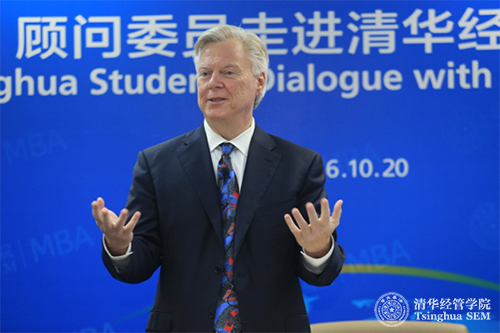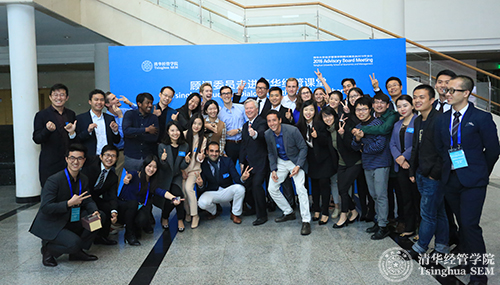On Thursday, October 20, 2016, MIT Sloan School of Management Dean David Schmittlein joined a classroom of first- and second-year Tsinghua-MIT Global MBA students as part of 2016 Tsinghua Students Dialogue with Board Members series. Although the dialogue was wide-ranging, much of the conversation hinged in some fashion on leadership - a frequent topic of discussion in MBA classrooms, but one on which conclusions are often anything but unanimous.
Dean Schmittlein opened the conversation by acknowledging a distinction between management - which, at its most basic, Dean Schmittlein suggested, might be defined as simply getting people to do what the organization needs - and leadership. He explored a further distinction between knowledge-based leadership - centered on buildableskills - and leadershiptraitsthat are often considered hard-wired elements of personality. Dean Schmittlein posited, however, that traits aren’t as fixed in a person’s early years as is commonly assumed, which begged his ensuing question: what would it look like (for instance, from an institutional or corporate vantage point) to be serious about fostering traits?

David Schmittlein, John C Head Ⅲ Dean, MIT Sloan School of Management, Tsinghua SEM Advisory Board Member
Leadership development programs and curricula have often focused on developing knowledge skills - communication and teamwork capacity, for example. However, from Dean Schmittlein’s perspective, trait-building is often accomplished most effectively by voluntarily choosing experiences that require a moderate amount of the desired trait - courage, empathy, etc. As an illustration of this point, Dean Schmittlein shared a glimpse into the narrative of Lorenzo Mendoza, CEO of Empresas Polar, a large South American food processing and packaging company.
Mendoza, who has been widely recognized for his social responsibility efforts in leading Empresas, has also come under heavy criticism and direct interference from leaders in his home country of Venezuela. Meanwhile, Mendoza has been hailed as a hero by many of his fellow citizens, given his efforts to maintain a consistent supply line for many of their basic needs via the arm of Empresas, even in the midst of national shortages, supply chain hiccups, and hyperinflation. Despite daunting opposition and obstacles, Mr. Mendoza has continued to push forward with a determination that has seemingly grown over time, rising in accordance with the magnitude of the challenges before his country and its people.

Dean Schmittlein’s foremost takeaway from Mr. Mendoza? “When you do things that require courage, it becomes addictive.”
From an education perspective, a worthwhile inquiry seems to be how to induce the choice of experiences that develop desirable leadership (or other) traits. In the case of MIT Sloan, students are not, for instance, required to participate in project-based learning experiences as part of their curriculum. However,opportunitiesto participate in such experiences are abundant. As Dean Shmittlein argued, requiring project-based learning experiences would turn them into a “box to check.” Rather, MIT Sloan endeavors to admit the types of students whochooseto place themselves in contexts in which they will be nudged to authentically grow. In turn, the school provides them with the opportunity to choose from a rich variety of precisely such contexts, in the expectation that those choices and their transformational results will continue to follow students well beyond graduation. Mr. Mendoza - himself an MBA alum of MIT Sloan - is one such example.
As a prospective future business leader, I found myself grappling with some of the implications of this insight. Leadership development is necessarily a connected process. My own leadership development, if authentic, should invoke a cultivation of leadership qualities in those around me. However, my capacity to be selective in those I’m tasked with leading and developing will often be more limited than that of highly reputable institutions such as MIT Sloan and Tsinghua SEM. I may not always have the luxury of substantial choice in whom I’m leading and their predispositions towards building particular personal traits.
Perhaps, though, it is in those contexts that Dean Schmittlein’s proposition is all the more salient. My choice may not always be as much about whom I get to lead as about whether to embrace the uncertainty that comes with such contexts and thus build a trait of willing adaptiveness that other circumstances might not require. Similarly, finding a way to frame trait-building choices in an attractive light for others who must make those choices is itself an important leadership skill.
Ultimately, it seems, Dean Schmittlein’s argument was less about pitting leadership skillsversusleadership traits than about growing the skillsin combination withtraits. For a classroom full of aspiring global leaders, distinguishing between the two and being equipped to develop both affords an extra tool in an ever-growing toolbox as we size up the consequential challenges that we hope to tackle in the years to come. (by Tim Hesler, GMBA Class of 2017, Tsinghua SEM)
 Latest News
Latest News